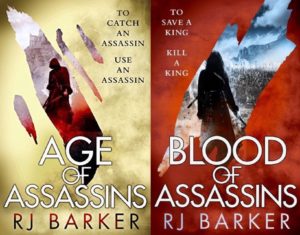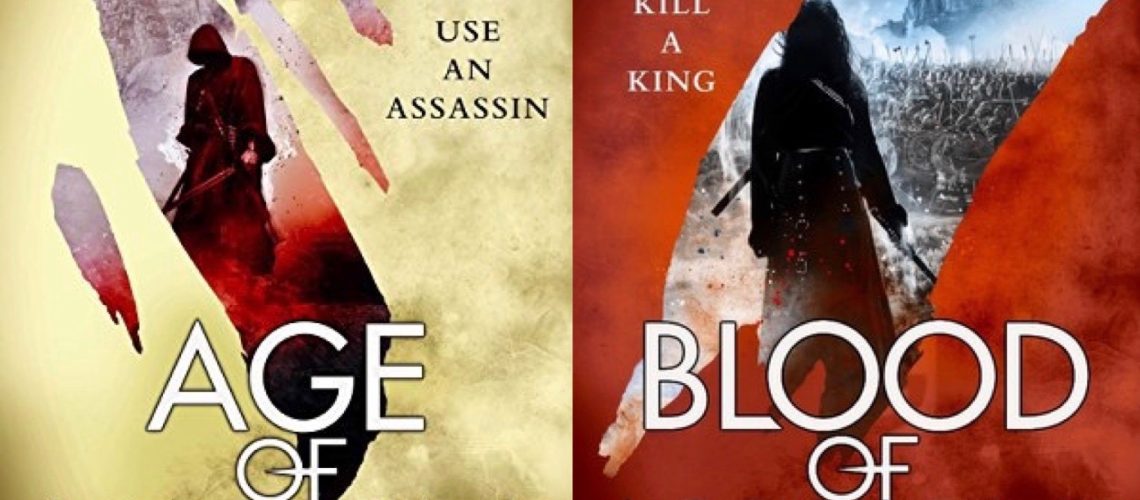RJ Barker’s Wounded Kingdoms Trilogy in its first two volumes, Age of Assassins and Blood of Assassins, combines a straightforward western fantasy world with deeper and more intriguing worldbuilding with a flawed and unusual protagonist to good effect. The two novels, together with the forthcoming third, tell a story of an apprentice assassin who slowly emerges into a figure that helps shape the destiny of an entire kingdom.

Age of Assassins, the first in Barker’s Wounded Kingdoms trilogy, starts the story of Girton Club Foot. Girton has a deformed leg, but this has not stopped his master Merela from training him in her own art of assassination. Summoned to Castle Mainyadoc, Girton and his master are, as it so happens, not there to assassinate someone, as one might expect out of summoning assassins. Instead, they have been hired to prevent an assassination. The succession is not certain, and the Heir to the throne is under threat. Queen Adran recognizes that these are perilous times for her son, and keeping him safe is her goal.
So instead of to catch a thief, set a thief, it is time to catch an assassin by setting an assassin. Or two, to be precise. There are plots and intrigues afoot, and a prior relationship between Merela and the Queen is the thread that binds both Assassin and apprentice to the dangerous locale and their equally dangerous mission.
Hiring assassins is a good way to get other killers and assassins to be flushed out of the woodwork. And worse people, perhaps. For this is a world where the practice of magic is violently expunged. Magic is powerful, effective…and absolutely ruins the lands upon where it is cast. Sorcerers here are violently dangerous and anyone even suspected of being a sorcerer is dealt with extreme prejudice. To be even suspected of having magical abilities is a good way to get oneself killed, and keeping that secret is vital. And so the story of a lifetime of a character devoted to the arts of killing and death begins. One with that secret magical power himself.
The world that Barker creates in Age of Assassins is a fascinating one that enthralled me. Sure on the surface, with the names and the general culture, it looks like a straightforward Western European sort of world. But there is more here than that. The culture of the assassins, the destructive nature of magic, and just what has happened to the Gods (well almost all of them) are all slowly revealed in the course of the novel, providing a rich tapestry of a world to explore in terms of culture and history. It goes far beyond that basic well worn template into something that interests me as a reader.
I did like the flashbacks, foreshadowing and larger hints of a temporal frame in the novel as well. The novel very deliberately feels and acts as it is the first part of a greater story, a sense that this is a story that has occurred and now is being told to the reader gives the story a sense of a biography rather than a strictly straightforward narrative. Girton, being an assassin in training, and yet vulnerable and flawed (as seen with his club foot, his youth and the circumstances of the formation of his personality), and his overall history makes for an interesting character to be fit into that enthralling worldbuilding. He is the star of the novel, and is an unlikely protagonist, all the more cherished for his unusual nature.
Age of Assassins is a worthy debut novel.
In Blood of Assassins, Girton’s adventures continue. After the intrigues of heirs and assassins,, Girton and his master have gotten out of Dodge, and gone quite far away from Castle Mainyadoc where their previous efforts to prevent an assassination led, in the end, to the installation of a new King, and in fact, a civil war. Returning back to the series-titular Wounded Kingdom, Girton and his gravely wounded master are caught in the midst of that Civil War, still going on five years after their departure. They have had adventures, traveled far, but returning to the scene of the crime, as it, were, proves perilous, as Girton is caught in intrigues between the rival Kings, and within the camp of one King in particular — his friend, Rufra.
This second volume mostly pulls back from the foreshadowing nature of the first volume in favor of a more straightforward narrative. This feels like an important episode, but it is not one that seems to be looked at from a backward perspective, as the first volume’s final line suggested. Unusual and strange things happen here, and there is plenty of character growth for Girton, especially since he really is on his own for this volume. It is in the epilogue, really that we get that sense of looking forward and back.
That said, however, the second volume besides that tonal shift feels stronger in every way. Having Girton pushed way outside of his comfort zone, and making this a true coming of age story (with his master sidelined for most of the plot) is a good chance for Girton to grow, and the writing feels like it grows with it. We do return to Castle Mainyadoc, which gave the aforementioned claustrophobic feel above, which worked, and here, going broader is a new challenge that the author rises up to. We get more of that juicy worldbuilding from the first novel, explaining more the backstory of how this crapsack world has gotten this way, and what Girton’s place in it really is and what all that means. I could, though, frankly wish for a map of his world.
I also want to mention the audio narration. As opposed to reading the first novel, this novel I decided to listen to in audio form. The narration by Joe Jameson is excellent throughout, with a good range of voices, and good modulation of tone and intonation that made listening to the book a pleasure. If the narrator returns for the third volume, I would be as amenable to listening to the third book as reading it, maybe even a bit more so.
With these first two volumes, Age of Assassins, and Blood of Assassins, RJ Barker has gotten firmly onto my fantasy radar. I look forward to the third volume in the Wounded Kingdom series, King of Assassins. Judging from the blurb, it sounds like another, even larger time jump is in store to this third book than between the first two. How Barker will try and finish this series and manage the end of Girton’s story is something I want to find out.







